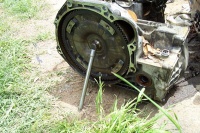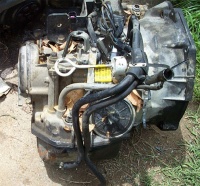Difference between revisions of "F4A33"
m (Protected "F4A33" [edit=sysop:move=sysop]) |
Cartman02au (talk | contribs) |
||
| (One intermediate revision by the same user not shown) | |||
| Line 2: | Line 2: | ||
[[Image:F4a33_front.jpg|right|thumb|200px|The front of a F4A33 out of a 4-cylinder second generation Magna]] | [[Image:F4a33_front.jpg|right|thumb|200px|The front of a F4A33 out of a 4-cylinder second generation Magna]] | ||
| − | The '''F4A33''' is a four-speed electronic automatic transaxle built by Mitsubishi and used in [[:Category:Second Generation|Second Generation]] Magna/Veradas. | + | The '''F4A33''' is a four-speed electronic automatic transaxle built by Mitsubishi and used in [[:Category:Second Generation Magna/Verada|Second Generation]] Magna/Veradas. |
The F4A33 is quite different to the [[KM177-6]] used in carburettored second generation Magnas. It has more clutch plates (4 front, 5 rear and 4 end whereas the KM177-6 has 3 front, 3 rear, 4 end), has a four-bolt torque convertor with a stall speed of 1800 - 2800 rpm. It also came in eight different variants: | The F4A33 is quite different to the [[KM177-6]] used in carburettored second generation Magnas. It has more clutch plates (4 front, 5 rear and 4 end whereas the KM177-6 has 3 front, 3 rear, 4 end), has a four-bolt torque convertor with a stall speed of 1800 - 2800 rpm. It also came in eight different variants: | ||
| Line 50: | Line 50: | ||
|} | |} | ||
[[Category: Automatic Transaxles]] | [[Category: Automatic Transaxles]] | ||
| − | [[Category: Second Generation]] | + | [[Category: Second Generation Magna/Verada]] |
Latest revision as of 01:34, 11 January 2010
The F4A33 is a four-speed electronic automatic transaxle built by Mitsubishi and used in Second Generation Magna/Veradas.
The F4A33 is quite different to the KM177-6 used in carburettored second generation Magnas. It has more clutch plates (4 front, 5 rear and 4 end whereas the KM177-6 has 3 front, 3 rear, 4 end), has a four-bolt torque convertor with a stall speed of 1800 - 2800 rpm. It also came in eight different variants:
- F4A33-1-MPN1: 25 teeth splined driveshafts, used in 4 cylinder models
- F4A33-1-MPP1/2: 27 teeth splined driveshafts, used in 4 cylinder models
- F4A33-1-MPQ2: 27 teeth splined drive shafts, special transaxle control unit, used in 4 cylinder models
- F4A33-1-MMN6: 25 teeth splined driveshafts, used in V6 models
- F4A33-1-MNP6/9: 27 teeth splined driveshafts, used in V6 models
- F4A33-1-MNQ3: 27 teeth splined driveshafts, special transaxle control unit, used in V6 models.
The differences between the variants seems minimal, their operation and specifications are the same. The major difference is that the F4A33-1-MNxx models have a different mounting point for the starter motor due to it being in a different location on the V6 engine.
As with all previous Mitsubishi four speed electronic automatics, the F4A33 had a lock up torque convertor controlled by the transaxle control unit. Gear selection is made by a series of valves inside the transaxle, which are actuated by the transaxle control unit. The transaxle control unit receives information on vehicle speed, throttle position, engine coolant temperature, fluid temperature, gear lever position, engine speed, overdrive switch and input and transfer shaft speeds.
The software in the transaxle control unit also featured power and economy modes, although the driver's selection was overridden if automatic transmission fluid temperature is below 20 º C - economy mode is automatically selected.
Technical data
| Lubricant | Mitsubishi ELC-4 ATF, Castrol TQM-SP, Valvoline Type M-II Special |
| Capacity | 7.5 Litres |
| Torque Convertor Stall Speed | 1800 - 2800 rpm |
| GEAR RATIOS | |
| Final Drive | 3.958 |
| 1st | 2.551 |
| 2nd | 1.488 |
| 3rd | 1.000 |
| 4th | 0.685 |
| Reverse | 2.176 |

